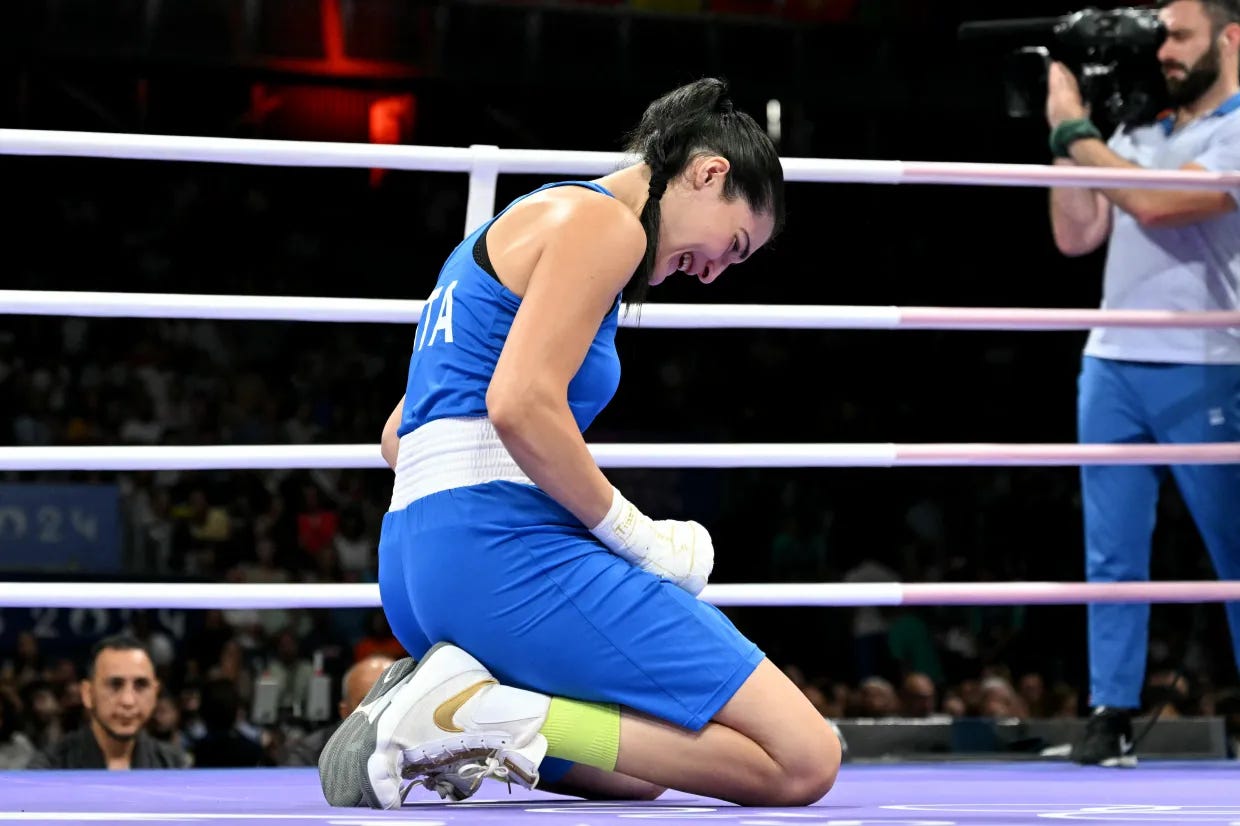Raging Bullshit
Italy's unfair boxing defeat at the Paris Olympics
Two punches and 46 seconds into her match at the Paris Olympics, Italian boxer Angela Carini walked away from her Algerian opponent Imane Khelif, refused to shake hands with Khelif, pulled away from the referee, fell to her knees sobbing and cried out, “This is unjust!”
It looked like a ridiculous stunt, unless you knew the details of the story. Carini isn’t injured or ill. She didn’t fold under the weight of performing on the Olympic stage. And she claims she didn’t walk away as a protest, although it did appear that way to many. The issue is that Khelif is fighting at the Games despite being disqualified from last year’s IBA Women’s World Boxing Championships for having excessively high levels of testosterone. About 10 months later, UNICEF named Khelif a national ambassador and a “top female boxer.”
After the Paris match, Carini said, “I’m used to suffering but I’ve never taken a punch like that. It was impossible to continue.”
One would assume Khelif’s testosterone levels were below the required threshold in time for the Games. This ignores that males have better hand-eye coordination. Or faster reaction time. Or narrower hips and therefore more torque when delivering punches. Or bigger hands. Or higher bone mass. Or greater lung capacity. Or longer reach. Still, there’s a colorable argument to be made that we should regulate testosterone in sports. Otherwise, we have to figure out the just response to cases like Khelif or Olympic champion female runner Caster Semenya. But in this case, the IOC didn’t enforce testosterone standards. Instead, it defended its decision to allow Khelif and Taiwanese trans boxer Lin Yu-ting to compete against women by explaining that both boxers “are women according to their passports.”
Remember when trans cyclist Veronica Ivy appeared on The Daily Show with Trevor Noah, claiming to be a biological woman because Ivy is made up of biological parts and has legal documents that say woman? The IOC is effectively using the same logic.
In 2022, Khelif fought Mexican boxer Brianda Tamara, who won bronze at the 2019 Pan American Games in Lima as was one of Mexico’s first female boxers to compete in the Olympics. Tamara later said, “I don’t think I had ever felt like that in my 13 years as a boxer, nor in my sparring with men. When I fought her I felt very out of my depth. Her blows hurt me a lot. Thank God that day I got out of the ring safely.”
That’s a world-class boxer saying thank God I got out safely. After Carini forfeited, author JK Rowling asked, “What will it take to end this insanity? A female boxer left with life-altering injuries? A female boxer killed?”
After the fight, the Algerian Boxing Federation congratulated Khelif on Facebook for defeating Carini “in less than 46 seconds, effortlessly.” I don’t doubt it was effortless, but I have questions about why. Now there’s discussion over whether Khelif is trans or has differences in sexual development (DSD), meaning XY chromosomes but female reproductive organs. Khelif has not confirmed this. It’s an interesting wrinkle, but it doesn’t change the fact that Khelif is a biological male, with blood testosterone levels in the male range, competing against women. And I doubt we would be having this conversation if not for our current political climate having brought us to this point. Yes, this puts Khelif in an unfortunately complicated position. But that shouldn’t mean that the IOC then puts every other female boxer in a worse position.
Muhammad Ali once said, “The fight is won or lost far away from witnesses—behind the lines, in the gym, and out there on the road.”
This fight was also won away from witnesses—behind the lines of a movement, in the gym of social media, and on the road in protests.





Letting men compete against women, especially in contact sports, makes a total mockery of anti-doping regulations.
Thank you, David, for highlighting this travesty, this disgrace, this utter nonsense. Shame on Algeria for celebrating this “victory,” shame on the “fighter” himself, and shame on all those who promote or even condone this. May we come to our senses before Rowling’s warning comes to pass.